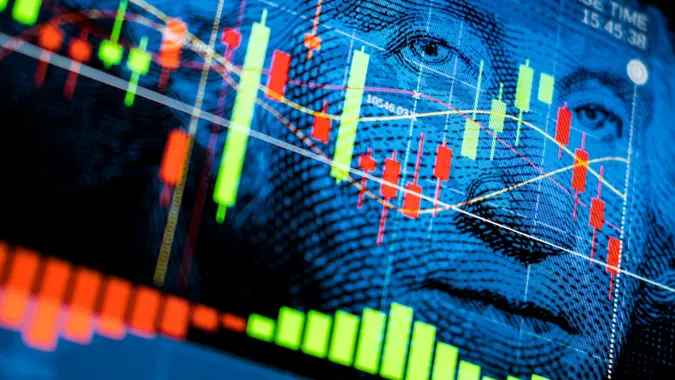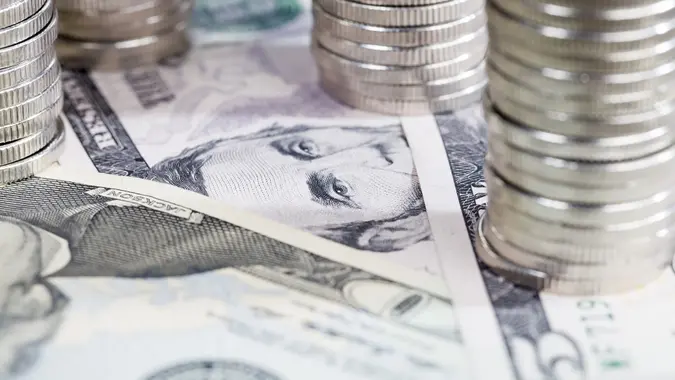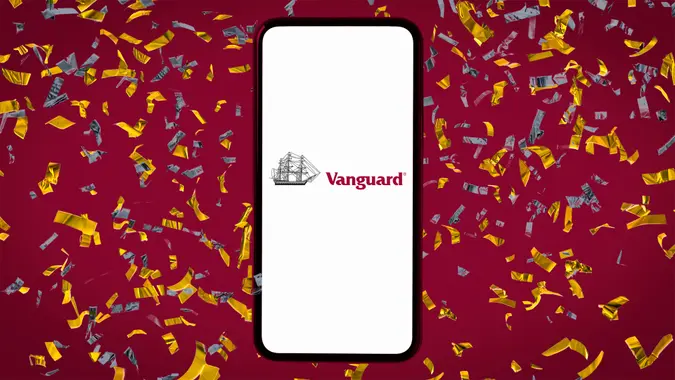Are CDs Worth It?

Commitment to Our Readers
GOBankingRates' editorial team is committed to bringing you unbiased reviews and information. We use data-driven methodologies to evaluate financial products and services - our reviews and ratings are not influenced by advertisers. You can read more about our editorial guidelines and our products and services review methodology.

20 Years
Helping You Live Richer

Reviewed
by Experts

Trusted by
Millions of Readers
If you’re looking for a safe place to park your money and earn a little extra along the way, certificates of deposit, or CDs, are worth a look. They often pay more than a traditional savings account, and your deposits are protected up to $250,000 by the FDIC.
But CDs come with trade-offs. Rates are tied to the Federal Reserve, which means they can shift up or down depending on the economy. They also lock up your money for a set period of time, so you’ll want to be sure you won’t need those funds in a pinch.
In 2025, CD rates have dipped slightly as the Fed lowers interest rates — but you can still find banks offering well above the average if you shop around. The key is knowing the different types of CDs, their pros and cons, and how to maximize your return without losing flexibility.
CD Rates in 2025
The Federal Reserve has been lowering interest rates, and CD yields have followed. As a result, the national average for a three-month CD is now 1.32%.
For context, the average was 1.54% on October 21, 2024, and 1.41% by May 19, 2025. While the overall trend has been downward, some banks still offer promotional CD rates that are well above the national average.
Benefits of Investing in CDs
- Safe investment. CDs are FDIC-insured up to $250,000, which means your money is protected even if the bank fails.
- Higher rates than savings accounts. Some of the best CD rates exceed 4.00% APY, offering stronger returns than many low-risk options.
- Fixed returns. When you open a CD, you lock in the interest rate for the entire term, so you know exactly what you’ll earn.
Potential Drawbacks of CDs
- Limited access to funds. Your money is locked in until the CD matures. Early withdrawals typically come with penalties (for example, Ally Bank charges 60 days of interest on CDs of 24 months or less).
- Lower flexibility than no-penalty CDs. You can avoid withdrawal penalties with a no-penalty CD, but the APY is usually lower than a standard CD.
- Locked interest rate. If rates rise after you open your CD, you won’t benefit from the increase. You’re stuck with the rate you locked in at the start.
CDs Feature a Locked Interest Rate
While a fixed return can be viewed as an advantage — especially if current interest rates go down — there’s also another consideration. If interest rates go up during your CD’s term, you’ll miss out on earning more.
Types of CDs
Not all certificates of deposit are the same. Depending on your goals and financial needs, you may want to consider one of these common types of CDs:
- Traditional CD. This is the most common type of CD, offering a fixed rate for a set term. The trade-off is that early withdrawals usually come with penalties.
- No-Penalty CD. These CDs let you withdraw your funds before the term ends without paying a fee. The rates are typically lower than traditional CDs, but the flexibility can be valuable.
- High-Yield CD. High-yield CDs pay more interest than standard CDs and are often available through online banks or credit unions. They may also require a larger minimum deposit.
- Bump-Up CD. With a bump-up CD, you can raise your rate once (sometimes twice) if interest rates increase during your term. This protects you from locking in at a lower rate.
- Step-Up CD. Step-up CDs automatically increase their rates at scheduled intervals. While you don’t control when the increases happen, you are guaranteed rate bumps.
- Jumbo CD. Jumbo CDs require a large deposit, usually $100,000 or more. They may offer slightly higher rates, though not always enough to offset the loss of liquidity.
- Brokered CD. These CDs are sold through brokerage firms instead of banks. They may provide higher yields, but can be harder to sell before maturity.
CDs vs. Other Investments
To help you decide whether opening a CD would be worth it to you, here are some alternative investment options to consider.
High-Yield Savings Accounts
One of the highest high-yield savings rates is 4.30% APY. Even though high-yield savings accounts may offer less interest than some CDs, they are much less restrictive when it comes to accessing your money.
Money Market Accounts
One of the highest money market account rates right now is 4.31% APY, which is higher than what you can currently earn with the highest-earning CDs. Although money market accounts allow you more access to your money than a CD does, it will typically require you to keep a minimum balance. If you can’t maintain the minimum, usually at least $2,500, you may have to pay a monthly maintenance fee.
Money market accounts usually come with checks or a debit card, giving you easier access to your money.
Treasury Bills and Bonds
Treasury bills and savings bonds are another way to earn interest on your money. Like CDs, you won’t have access to the money you invest until the bill or bond reaches maturity. However, the interest rates for these types of investments are often much lower.
Treasury Inflation-Protected Securities (TIPS)
TIPS are government bonds designed to protect your investment from inflation. The principal adjusts with inflation, so you maintain purchasing power — something CDs can’t guarantee if inflation rises.
Fixed Annuities
Fixed annuities can provide guaranteed interest rates and predictable income over time, sometimes for life. They can be a good option for long-term savers, though they often come with higher fees and less flexibility than CDs or savings accounts.
Strategies for Maximizing CD Returns
Here are some strategies to consider to maximize certificate of deposit returns.
CD Laddering
One way to take advantage of the safety and different interest rates offered by CDs is to create a CD ladder. This involves dividing your investment across several CDs with different maturity dates, such as one year, two years, three years, four years and five years.
As each shorter-term CD matures, you can either use the money or reinvest it in a new five-year CD, preferably at a higher interest rate. This strategy not only helps maximize your returns but also provides you access to your funds at regular intervals as each CD reaches maturity.
Shop Around for the Best Rates
It’s important to compare CD terms and rates from different banks and credit unions to find the best rate. Even a small difference in the interest rate can make a difference in your earnings over time.
For example, if you invest $10,000 in a 12-month CD that pays 4.50% APY with monthly compounding interest, you’ll earn $450.02 by the end of the term. However, if you invest $10,000 in a CD with the same term and a rate of 5.00% APY, you’ll earn $500.01 — about $50 more.
Economic Factors Influencing CD Rates
Here are a couple of ways the economy influences CD rates.
Federal Reserve Actions
CD rates are heavily influenced by the Federal Reserve’s interest rate decisions. When the Fed raises rates, banks typically increase the rates offered on CDs.
Conversely, when the Fed cuts rates, banks often decrease CD rates. Keeping an eye on these trends can help you time your CD investments to maximize returns.
Inflation
Inflation can erode the interest earned on CDs and cause you to lose money. For example, in 2022, inflation was 6.42%, and the yield on a 12-month CD was only 2.35%, which means that the real return on the CD after inflation and taxes for a married couple filing jointly with $100,000 of taxable income at a 22% tax rate was -4.59%, according to data analyzed by Hartford Funds.
During periods of high inflation, even high-interest CDs might not keep pace with the increase in prices, making real returns less attractive.
When CDs Make Sense (and When They Don’t)
CDs are best in scenarios where you won’t need to use the money for the entire term. That makes them a great savings vehicle for:
- Saving for retirement
- Savings goals like vacation, down payment on a home or another extra expense
However, CDs are not great for sudden and unexpected expenses that are best suited for an emergency fund. You should set aside money for unexpected medical or car bills in an account that you can access at once and without penalty.
The Bottom Line
If you have money you don’t need access to for a few months and you find a bank that offers a high CD rate, it might be worth it for you. Especially if you can’t find a high yield savings account or money market account that matches it.
Just make sure you decide quickly, as the bank might not offer the same rate in the next week.
FAQ
Here are answers to some of the most frequently asked questions about investing in CDs.- Are bank CDs worth it compared to savings accounts?
- If you can find a CD with a higher rate than a savings account, then yes. CDs allow you to lock in rates for the entire term, while the rate of a savings account can change at anytime.
- What happens if I withdraw from a CD early?
- Many CDs will charge you a penalty. For example, at Ally Bank, the early withdrawal penalty on CDs with terms of 24 months or less is 60 days of interest. Check with your bank to find out its early withdrawal penalties for CDs.
- Can I lose money with a CD?
- If rates go up while your money is in a CD, you will not earn as much money from interest as you could with another account. You could also lose money if you have to withdraw money early.
- How are CD rates determined?
- Banks decide CD rates based on a few factors:
- The rates set by the Federal Reserve
- How much cash the bank needs.
- The interest rate the government will pay on its debts. This is known as the treasury yield.
- How long your term is. Some banks offer higher rates for agreeing to longer terms.
- Banks decide CD rates based on a few factors:
- Are CDs safe during a recession?
- If you choose a CD from a FDIC-insured bank, your investment is insured up to $250,000. This gives you protection in the event the bank fails.
Our in-house research team and on-site financial experts work together to create content that’s accurate, impartial, and up to date. We fact-check every single statistic, quote and fact using trusted primary resources to make sure the information we provide is correct. You can learn more about GOBankingRates’ processes and standards in our editorial policy.
- FDIC. "Deposit Insurance FAQs"
- Consumer Financial Protection Bureau. "What is a money market account?"
- FDIC. "Q: What does FDIC deposit insurance not cover?"
- Citizens Bank. "What is a money market account?"
- Hartford Funds. "What’s the Real Return on 12-Month CDs?"
 Written by
Written by  Edited by
Edited by 

























